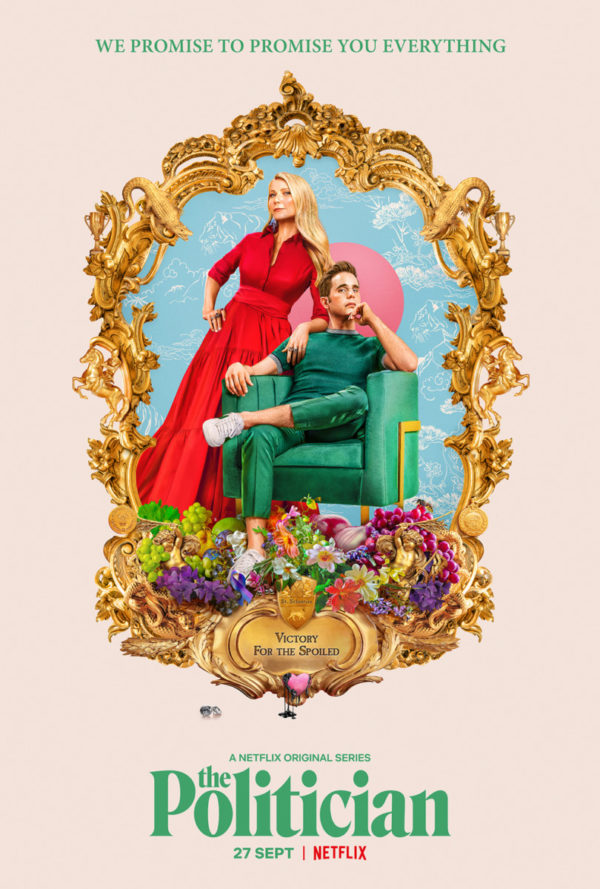“The Politician” pushes the limits of the high school trope
November 1, 2019
Showcasing the behind-the-scenes ugliness of the life of a leader, Ryan Murphy’s “The Politician” eclipses its overused plotline with a careful eye for detail.
Murphy is most well known for his Golden Globe winning TV show, “Glee.” With his background in showcasing “different,” it’s no surprise that his newest work uniquely highlights a life of privilege and power while trying to be ordinary.
Netflix released “The Politician” worldwide on Sept. 27, instantly gaining viewership from devout followers of the show’s actors.
Tony Award-winning lead Ben Platt and actress Laura Dreyfuss previously worked together in the award-winning musical, “Dear Evan Hansen,” and Dreyfuss has also individually worked with Murphy on other projects, such as the final season of “Glee.”
Despite some big names, “The Politician” was built off of smaller elements. The majority of its cast consists of new actors, and its close attention to detail is what elevates the show from cliché to abnormally fantastic.
The show follows near-sociopathic Beverly Hills teenagers who aspire to win the position of student body president. These students embody real politicians, with their impassive faces and impressive facades, clawing their way to victory with no thought about the ways they scar the people around them.
In the ring that is St. Sebastian High School, Payton Hobart (Platt) and Astrid Sloan (Lucy Boynton) fight to the death, with the circus masters being their own insecurities and uncontrollable ambitions.
They are supported by their loyal teams; the best-dressed advisor McAfee Westbrook (Dreyfuss), best friend James Sullivan (Theo Germaine) and cunning girlfriend Alice Charles (Julia Schlaepfer) on team Payton, and gender non-conforming Skye Leighton (Rahne Jones) supporting Astrid.
Payton has dreams of becoming the President of the United States, and according to his incessant research, the only thing left to do is to become the student body president.
The trope of teens trying to dominate their high school is demonstrated in just about every piece of cinema and it seemed like “The Politician” was going to fall into that trap.
But that thought is demolished within the show’s first few minutes. From the nearly unnoticeable symbolism with color to the play on words that become more obvious as the pilot progresses, “The Politician” makes itself unique by placing its standard for cinematography at the highest pedestal.
Within the first five minutes, a major color contrast is shown with River, a charismatic boy for whom Payton slowly develops feelings. River’s room is shown with dark colors — navy blue, brown and black — whereas the rest of his house and his girlfriend are in pastels. This stark difference is akin to his personality, the happiness he portrays versus the darkness inside him which is revealed later in the episode.
The characters are three-dimensional, while somehow remaining machine-like in their quests to reach the top. This lack of emotion adds distance from the characters, but when their flaws and true nature are revealed, the parallels between their and a spectator’s life come through.
Payton himself is a perfect example of this. He remains mechanical, stating that he doesn’t know how to feel emotions throughout the season, not even flinching when he sees his girlfriend cheating on him. However, there are small pockets of feelings, like when he sheds a tear as his mom departs from a train station, which makes the audience empathetic towards him.
“The Politician” also showcases Platt’s musical ability. His rendition of Joni Mitchell’s “River” breaks hearts, and his lead in the school musical definitely allows him to show off a bit.
However, a brighter gem was hidden amongst the grief of the initial episodes. Platt came out with his first album “Sing to Me Instead” this year, and he subtly played the chorus of his song “Run Away” on the piano multiple times while near River.
Aside from its conversations about the necessity of emotional release, “The Politician” lightly touches on a variety of topics from gun control to the LGBTQ+ community. They develop these sensitive topics by allowing each one to be reserved for a specific character.
A topic dear to the show is mental health as suicide is shown in the first episode. Many characters mention experiencing depression as well, bringing light to this struggle in high school students’ lives.
By allowing viewers to engage in these heavy topics with a hint of comedy, “The Politician” ensures that its overarching message of over-ambition is heard by a wide range of audiences.
“The Politician” may seem ordinary at first glance, but the depth and drama associated with it cannot go unnoticed by anyone. A second season is confirmed to release early fall 2020.


